Net migration: Eastern Europeans fled Britain in Brexit aftermath ONS figures show
Net migration drops to a two-year low but is still a way off Conservatives' "tens of thousands" pledge.
Net migration into the UK fell by 49,000 in the 12 months to September 2016. It is now at it's lowest level for two years. The figures cover the nine months preceding and the three months following the EU referendum.
Some 273,000 more people settled in Britain than emigrated from it between October 2015 and September 2016 – the first time the net figure has dipped below 300,000 since June 2014.
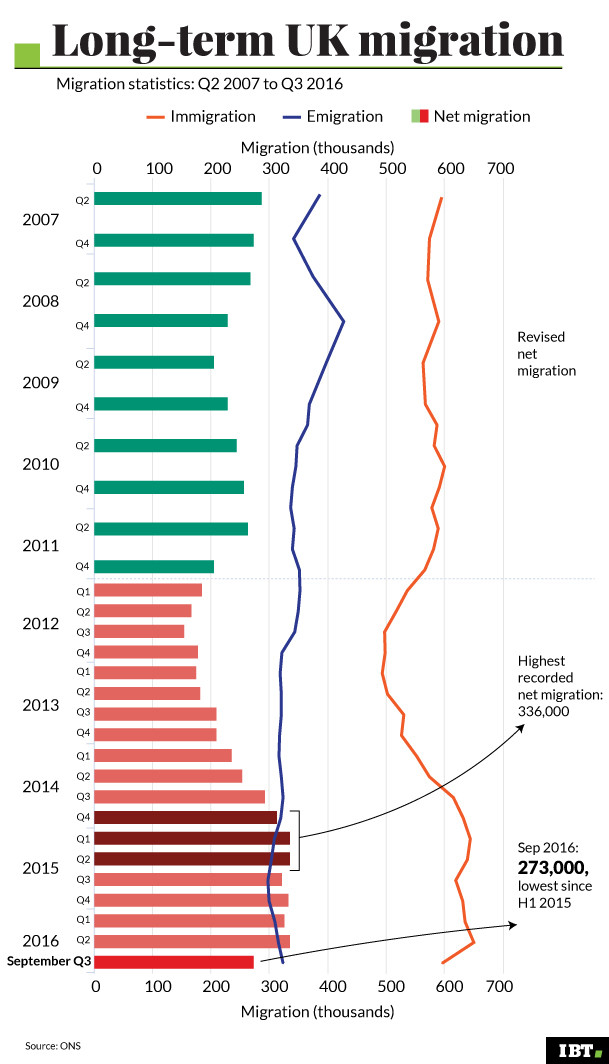
Immigration minister Robert Goodwill said: "The fall in net migration is encouraging. But this is just one set of statistics and we must not get carried away. We will continue to make progress to bring down net migration to the tens of thousands."
Net migration from the so-called "EU-8" countries – Estonia, Latvia, Lithuania, Poland, Czech Republic, Slovakia, Slovenia and Hungary – fell by more than 50% from 41,000 to 19,000 on the previous year.
The ONS described this as a "statistically significant decrease" and it will prompt analysts to wonder whether low and semi-skilled workers from these countries have been put off plying their trades in the UK following the referendum.
The equivalent figures from the "EU-2" of Romania and Bulgaria showed an increase from 48,000 to 64,000 over the same period and net migration from the remaining, generally richer, EU countries also rose on the previous year but only slightly: from 80,000 to 81,000.
"It is too early to say what effect the referendum result has had on long-term international migration," said Nicola White, head of international migration statistics at the ONS.
Net migration statistics result from the difference between the number of people immigrating into a country and the number of people emigrating from a country over the same period of time. In the year to September 2016 some 596,000 long term immigrants entered the UK while 323,000 people left to settle abroad.
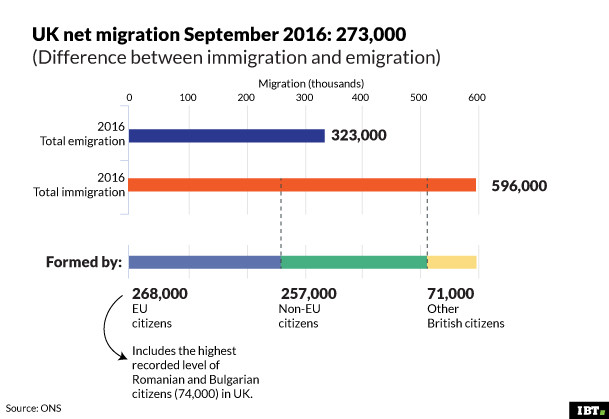
Under David Cameron, the Conservatives pledged to get net immigration down to the tens of thousands – an ambition they have not discarded but which still seems a long way off.
Ukip immigration spokesman John Bickley said: "Today's migration figures show yet again that the Tories' promise of reducing immigration to the tens of thousands is a hollow promise: are they misleading the British people or incompetent, most likely both.
"Earlier this week the Brexit minister David Davis let the cat out of the bag by indicating that uncontrolled immigration from the EU may never be brought under control. What happened to Vote Leave to 'take back control'."
Long-term immigration from the EU has sharply rose from 2012 and then stabilised in 2012. The Office of National Statistics divide these figures into different groups based on the era in which a country joined the Union. In the year until September 2016, EU15 immigration was estimated to be 133,000 while EU2 immigration reached its highest estimate on record, 74,000. The EU15 comprises: Austria, Belgium, Denmark, Finland, France, Germany, Greece, Ireland, Italy, Luxembourg, Netherlands, Portugal, Spain, Sweden and the United Kingdom.
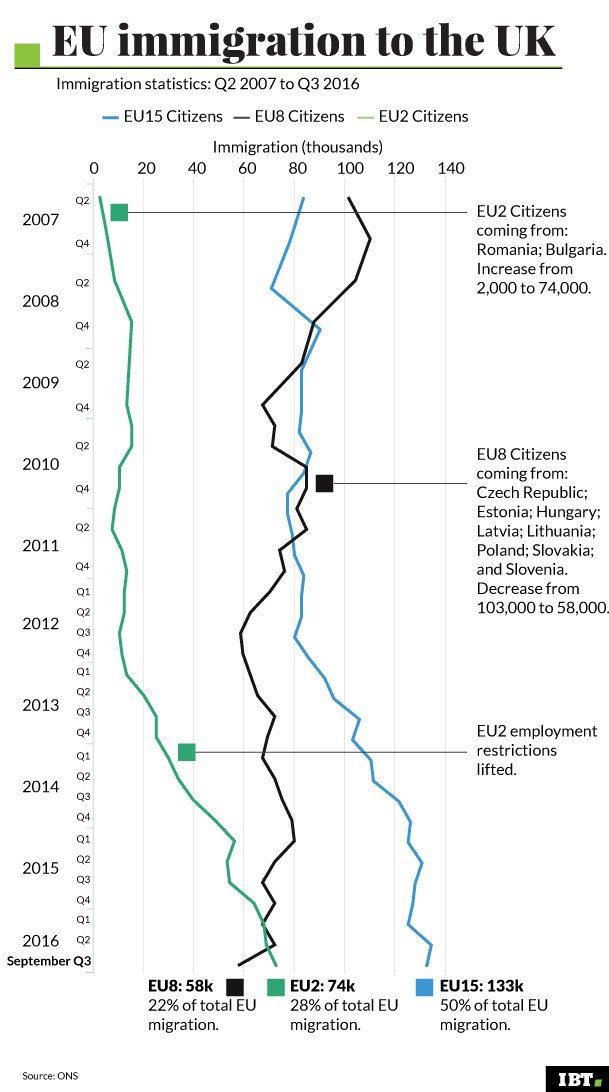
The ONS also released figures for the number of foreign nationals with National Insurance (NI) numbers – effectively a measure of the number of foreigners legally ready to work in the UK. Having peaked in 2014 shortly after employment restrictions on EU2 countries were lifted, the number of registered foreigners with NI numbers has fallen and stabilised.
The ONS warned that this data was "not a direct measure of when a person migrated to the UK because they could acquire an NI number at any time after they had arrived – or not register at all.
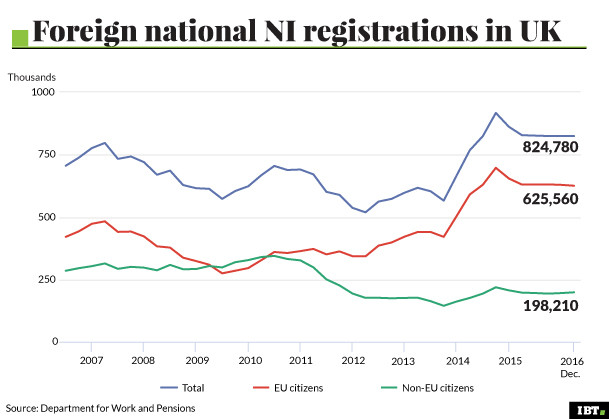
The data also showed a fall in the number of EU students coming into the UK. The Liberal Democrats pounced on this finding with peer Brian Paddick blaming post-referendum hate crime and the "government's poisonous rhetoric on immigration" for the fall.
White from the ONS said: "It is too early to tell if this is an indication of a long term trend".
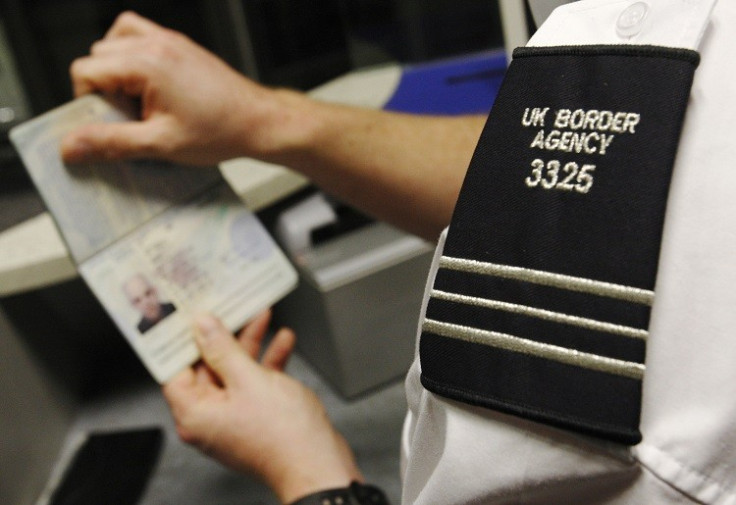
© Copyright IBTimes 2025. All rights reserved.





















